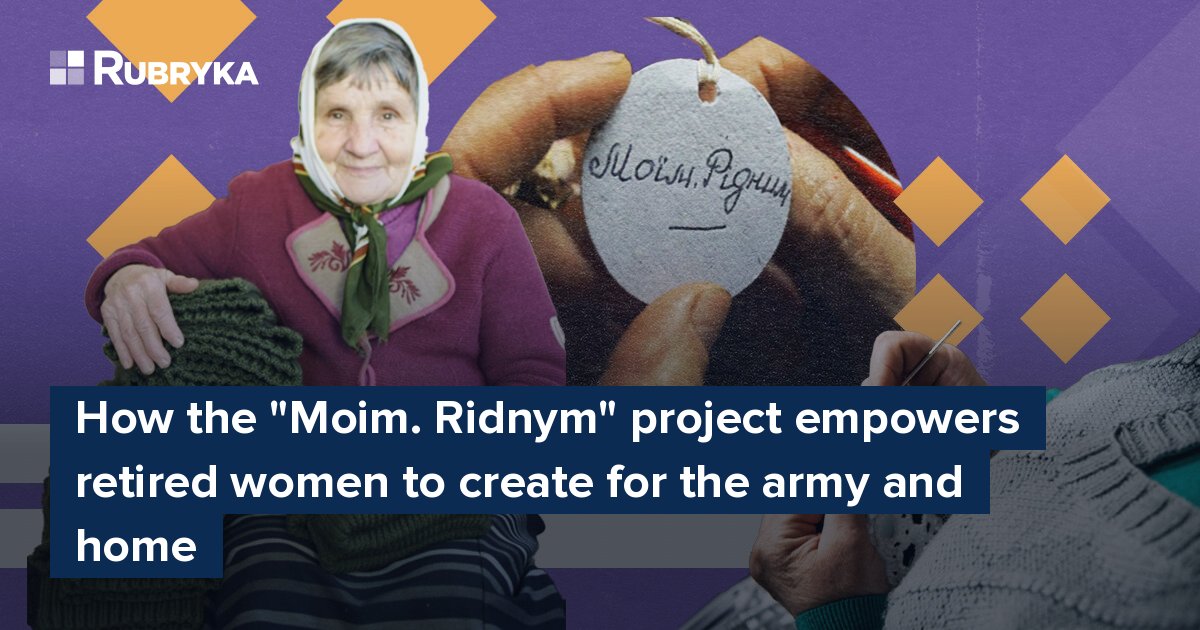
What is the problem?
Unfortunately, elderly people, having retired, often find themselves "overboard." Despite the lovely term "silver age," for numerous individuals in Ukraine, it isn't associated with preciousness but rather with feelings of loneliness, social isolation, uselessness, and inability to fulfill their potential.
Nowadays, many elderly Ukrainian women have sons, daughters, or other family members serving in the military. Therefore, the issue of loneliness and the longing for purpose has not disappeared but has become even more pressing.
What is the solution?
A few years back, in a village in the Sumy region, a project called "Moim. Ridnym" was launched to support women of a respectable age. It proved to be a solution to various social problems. Since its inception, elderly ladies from remote villages and hamlets in the region have been creating and selling various products such as herbal teas, aromatherapy items, linens, embroidered bags, knitted socks, decorative candles, and more. This allowed them to earn income for their basic needs and provided opportunities for socializing, connecting with others, and showcasing their creativity. The women shared their experience, wisdom, and perspective on the world through these cozy products with fellow Ukrainians.

Rubryka had prepared an article on the heartwarming efforts of the social enterprise "Moim. Ridnym" well in advance of February 24. However, at the time, our interview with the project's founder, Kira Okhrimenko, remained behind the scenes – as the full-scale war took over, all Ukrainians shifted their focus to other pressing tasks. The "Moim. Ridnym" project also took on new responsibilities and purposes – now serving as a volunteer initiative that brings warmth to those on the front lines. Thus, this year, Rubryka is revisiting our conversation on the initiative – both before the war and during its existence, discussing the importance of this work and how, despite new challenges, the project persists. Read more in the article below.
How does it work?
About returning to one's roots and gratitude
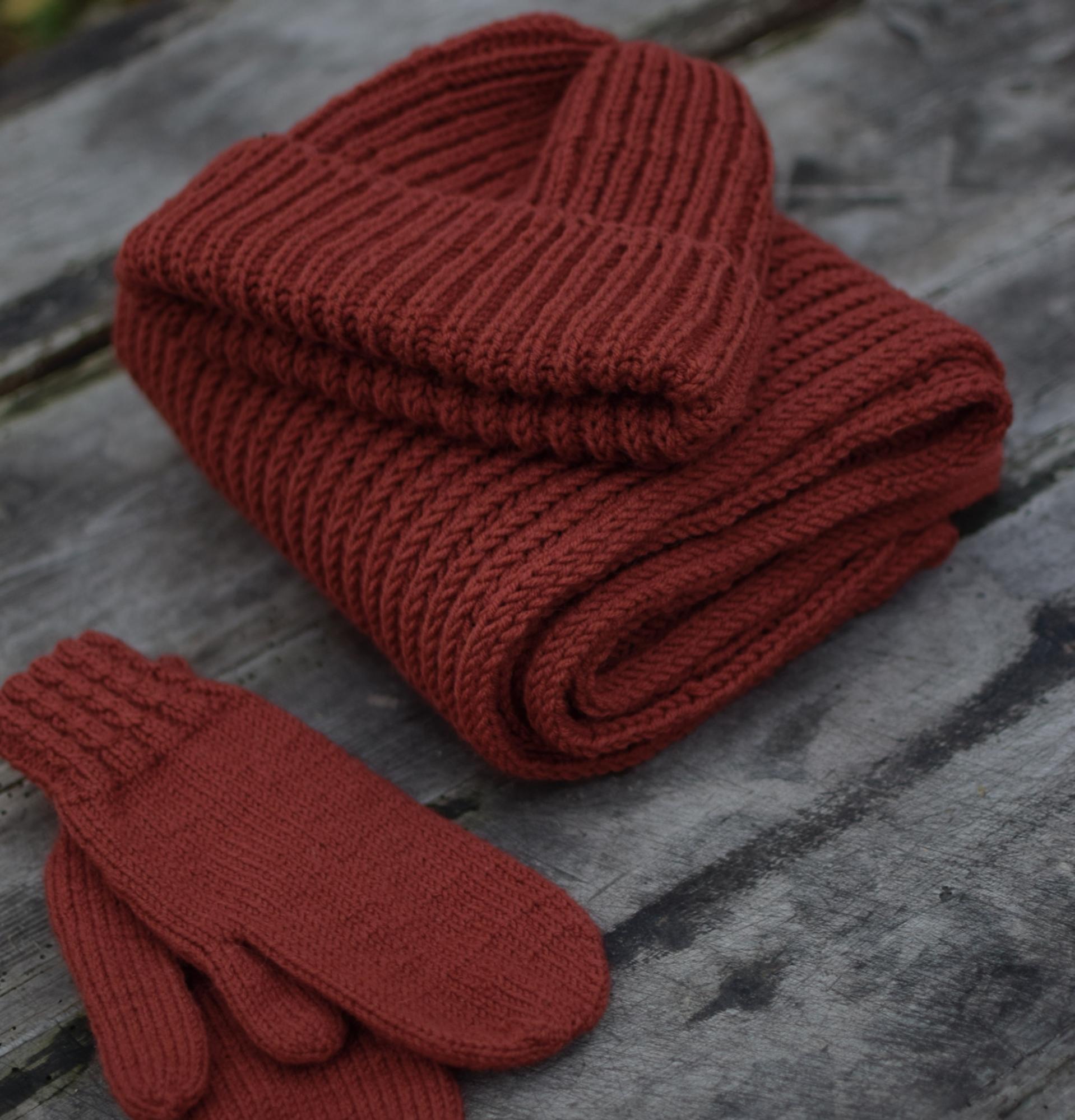
A warm set is one of the products of the "Moim. Ridnym" project
Before the start of the major war, "Moim. Ridnym" operated as an Instagram shop featuring products handcrafted by five elderly women from different villages in the Sumy region. However, it was more than just a store – it was a meaningful social concept centered around cherishing the importance of family, community, and essential human compassion. Kira Okhrimenko reminisces that the social enterprise "Moim. Ridnym" emerged from a deep appreciation, specifically for the people who had made immeasurable impacts on our lives and education.
"Our goal was never to improve sales. We aim to highlight the diverse and talented individuals in the villages. We want to remind people that grandmothers are more than just the delicious dumplings they make for us once a year on Christmas. They are individuals who deserve our attention," explains Kira Okhrimenko, the project's founder.
Kira lives in the capital and worked at the embassy before the war. She openly admits that she used to see the village as a place to escape from. But as she grew older, she was able to appreciate its authentic charm, even though she spent her childhood there with her grandmother. Kira fondly recalls how she went to her grandmother in the Sumy region for two months during the lockdown and was captivated by the blooming trees.

Kira Okhrimenko with her grandmother
"I strolled through the grass and dew barefoot, and my grandma exclaimed, 'Kira, goodness, have you lost your mind? What's happening to you?' But for me, it was all about getting back to nature. We should be more mindful of what we consume since we are a part of nature. That's why my family and I came up with the idea of replacing almost everything with natural alternatives. My grandmother first made us fruit bags and scented sachets. We thought, 'Could we give these fruit bags as gifts to our friends too?' They were interested as well. And then we remembered another elderly woman nearby who made her own candles, and that's how it all started," Kira says.

Afterward, more elderly women were discovered, eager to offer their goods. They said, "For free". Kira's concept was to find ways to assist them. With this concept and her grandmother's initial mint and chamomile tea products, Kira headed to BUR.LAB, which is a project management school run by the volunteer organization "Building Ukraine Together."
Once she returned, she set up an Instagram account for the new project. On this platform, she sold various products made by Sumy craftswomen, such as aromatherapy sachets with scents of pine needles and lavender, recycled paper felt notebooks, embroidered bag sets, candles, knitted socks, delicate lace angels, and more. These items brought a sense of coziness to people's homes and helped them feel connected to their ancestors.
"Through our social initiative 'Moim. Ridnym,' we have provided elderly women with valuable opportunities. Being a part of this project has allowed them to enjoy the company of peers and fulfill their creative passions. They have been able to utilize their exceptional talents and feel a sense of purpose," Kira Okhrimenko explains.
This experience is special because these women do not live collectively. They are not in small villages or retirement homes but in remote villages and hamlets scattered throughout the Sumy region. The "Moim. Ridnym" project was the first to support retired women who desired to be productive and active in these isolated areas.
About the challenges of war
Like most projects and brands, everything changed on February 24, 2022, for "Moim. Ridnym". Just like many Ukrainians, they no longer felt like creating visually pleasing products and embroidery, including linen and cozy socks. Therefore, the main activity of producing craft products has temporarily stopped.
The Sumy region is a border area. Russian troops invaded the Sumy region in the early days of their invasion. Most of the villages where craftswomen resided were occupied, and the people living there faced a severe humanitarian crisis. The organizers of the "Moim. Ridnym" project started searching for ways to provide the elderly residents of the villages, including the craftswomen, with essential supplies such as medication, food, and other humanitarian aid.

"Despite some farms having livestock and gardens to supply them with vegetables and preserves for the winter, there was a major shortage of medicines," explains Kira Okhrimenko. "We had to purchase them from larger cities, such as Lviv, and deliver them in large quantities to specific locations. Another challenge was the lack of bread; my grandmother had not stocked up on yeast. So, I contacted the Ukrainian Educational Platform, a partner in an educational program focused on social entrepreneurship. Thanks to their assistance, we delivered pallets of essential supplies to villages multiple times. Our first delivery went deep into the Sumy region on March 16, during the occupation. Fortunately, we could continue delivering to liberated villages through a chain of distribution. In total, we were able to provide aid to approximately 400 elderly individuals."
Naturally, they had to tackle the logistics issues, which were already complex. To transport their goods, they had to go through Lubny; there was no other option. The price of gasoline skyrocketed, and many men who used to assist with transportation in far-flung villages joined the military. Thus, everything had to be set up from scratch. However, the older craftswomen didn't just sit back and wait for a solution; they took small steps and made changes themselves.

Elderly artisans at work
Kira Okhrimenko can still remember how the women from the project stepped up with remarkable responsibility and enthusiasm in their work. Some began organizing or participating in the weaving of camouflage nets, while others took on the task of making trench candles. A few even devoted themselves to sewing tactical first-aid kits and vests. All of this was done in close partnership with the military, as many of their neighbors had already joined the army and wanted to assist "their" soldiers and fellow villagers.
"We are extremely grateful to them for their courage during the most critical moments. We also want to thank our subscribers and clients for their trust, as it is because of them that we have been able to gather the necessary funds for purchasing materials for our volunteer work," Kira expresses her gratitude.
She also mentions that she personally realized that leadership is often perceived narrowly – when we think of a leader, we tend to envision a young person. However, as her own experiences have taught her, older individuals can also exhibit leadership, especially during times of uncertainty and difficulty.
"My grandmother and the other women in the project have a unique ability to choose their words carefully to effectively convey important messages to their fellow villagers. Unfortunately, I cannot do the same as I live far away and do not fully understand the realities of that area," Kira admits. "It is crucial to identify priorities, express opinions, unite people towards a common goal, and support each individual's aspirations. It is essential that we do not underestimate the contributions of others and that we remain sincere and responsible. The women in our project have demonstrated these qualities since the beginning of the full-scale war. They acted swiftly and precisely, setting an inspiring example for me."
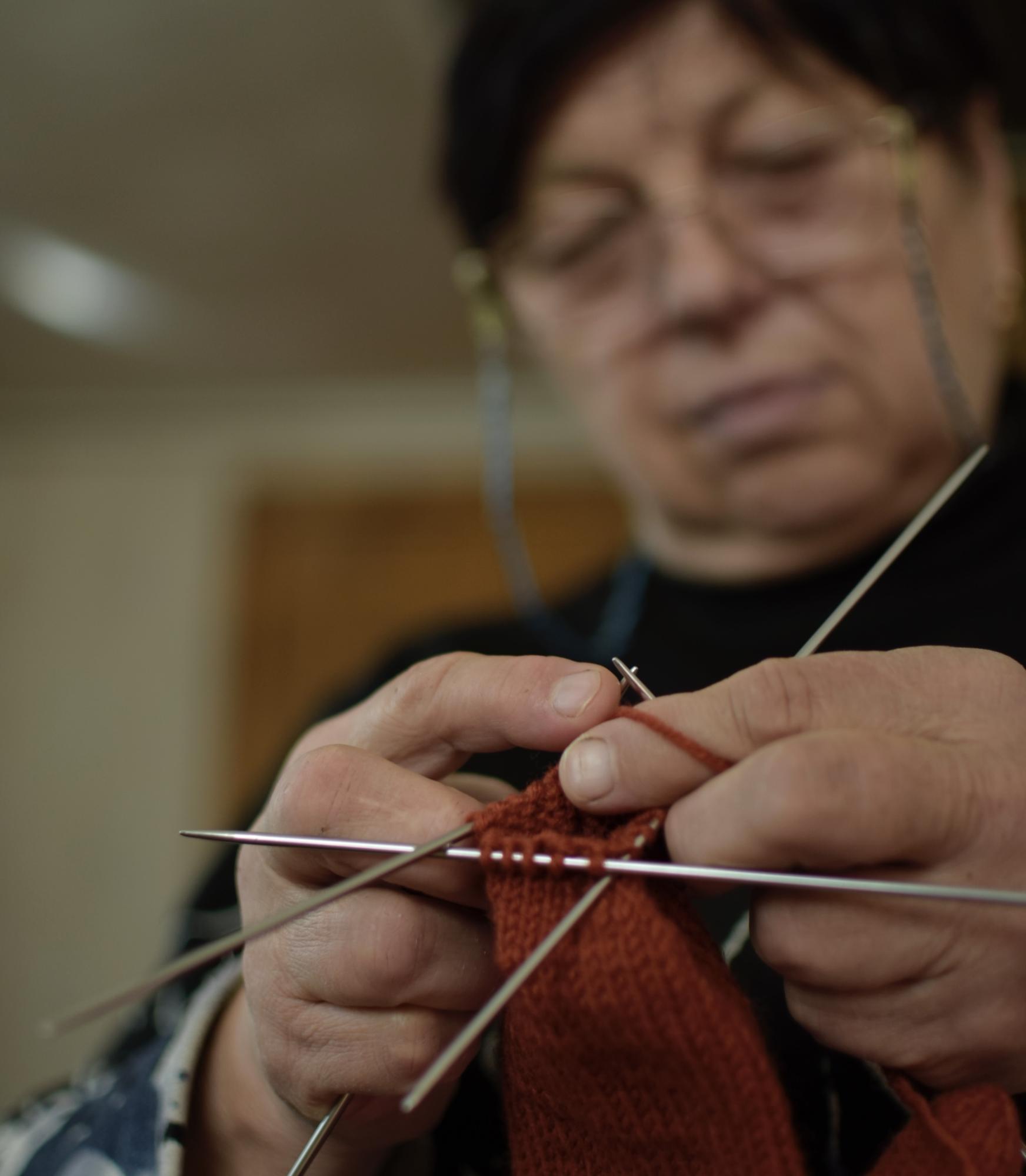
At the beginning of the war, khaki yarn became scarceShortly after, the social enterprise project carried on with its work. In 2022, Kira and her team also spearheaded a campaign to knit balaclavas and caps for the troops. Procuring yarn with the perfect thickness, materials, and shade proved to be a pretty daunting task.
"Back then, there was a major shortage of khaki-colored yarn. I want to think that people purchased it and knitted something for the military, showing their support for the fight for freedom," the project's creator explains.
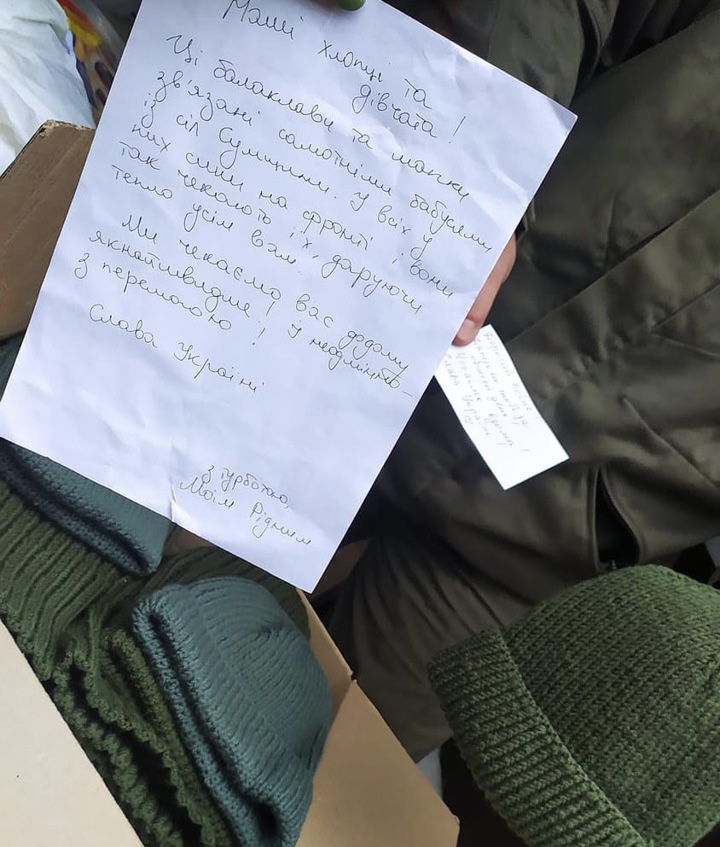
Knitted items and a letter to the military from the craftswomen of the project
Blackouts posed another challenge. According to Kira, while villagers were accustomed to enduring harsh conditions in their remote villages and dealing with regular power outages during the winter months, the absence of communication, frigid temperatures, and darkness became further hindrances to productivity. All work came to a complete halt when a sewing machine was required.
"Thankfully, most of our products are handmade by our skilled craftswomen, who knit by candlelight or with the help of headlamps. We prioritized the health and well-being of our workers, but the women insisted on continuing this tradition to make it through the harsh winter. The gesture of knitting balaclavas is a small token of appreciation towards our military and any challenges they face pale compared to the struggles of our service members in the trenches," Kira Okhrimenko stated.
About the circle of support
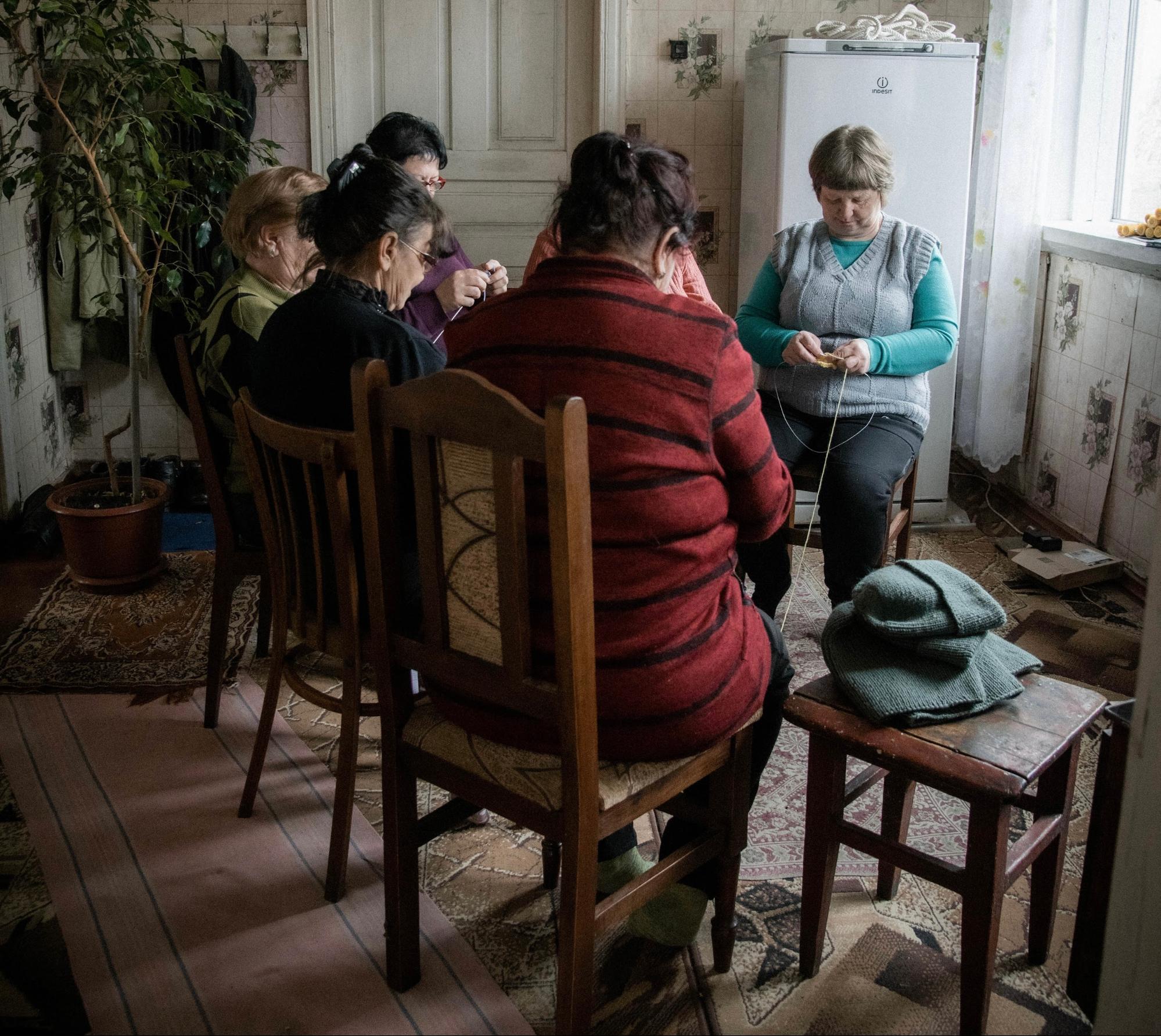
During the war, the women of the project became a circle of support for each other.
Philanthropists and non-profit organizations played a crucial role in ensuring the project's success during a challenging period last year. Thanks to a generous grant from the Platform for Social Change, the project procured multiple batteries, enabling continuous production and providing a place for local artisans to charge their devices during prolonged power outages. Additionally, benefactors from France and Great Britain also donated a generator, which proved to be incredibly useful. Despite frequent blackouts and challenges with heating, groups of women gathered in various huts, knitting together and bonding over shared concerns and aspirations.

Hats and balaclavas for the military from "Moim. Ridnym"
"Several of our elderly ladies have sons or other relatives serving at the front. This has made the issue of loneliness particularly challenging for them. Now, many of them share similar struggles and have formed a tight-knit support system for one another. One of our members, a skilled craftswoman, has been enduring the painful wait for her missing son for over a year. I can't even imagine the emotions she must be feeling. But she finds solace in keeping busy with her knitting, which helps her get through this difficult time," shares Kira.
"In our eyes, humanity is our top priority," adds Kira Okhrimenko. "Without strict deadlines, production quotas, and orders, it is crucial that our female team members in the project feel mentally and physically stable. We are dedicated to making this a priority."
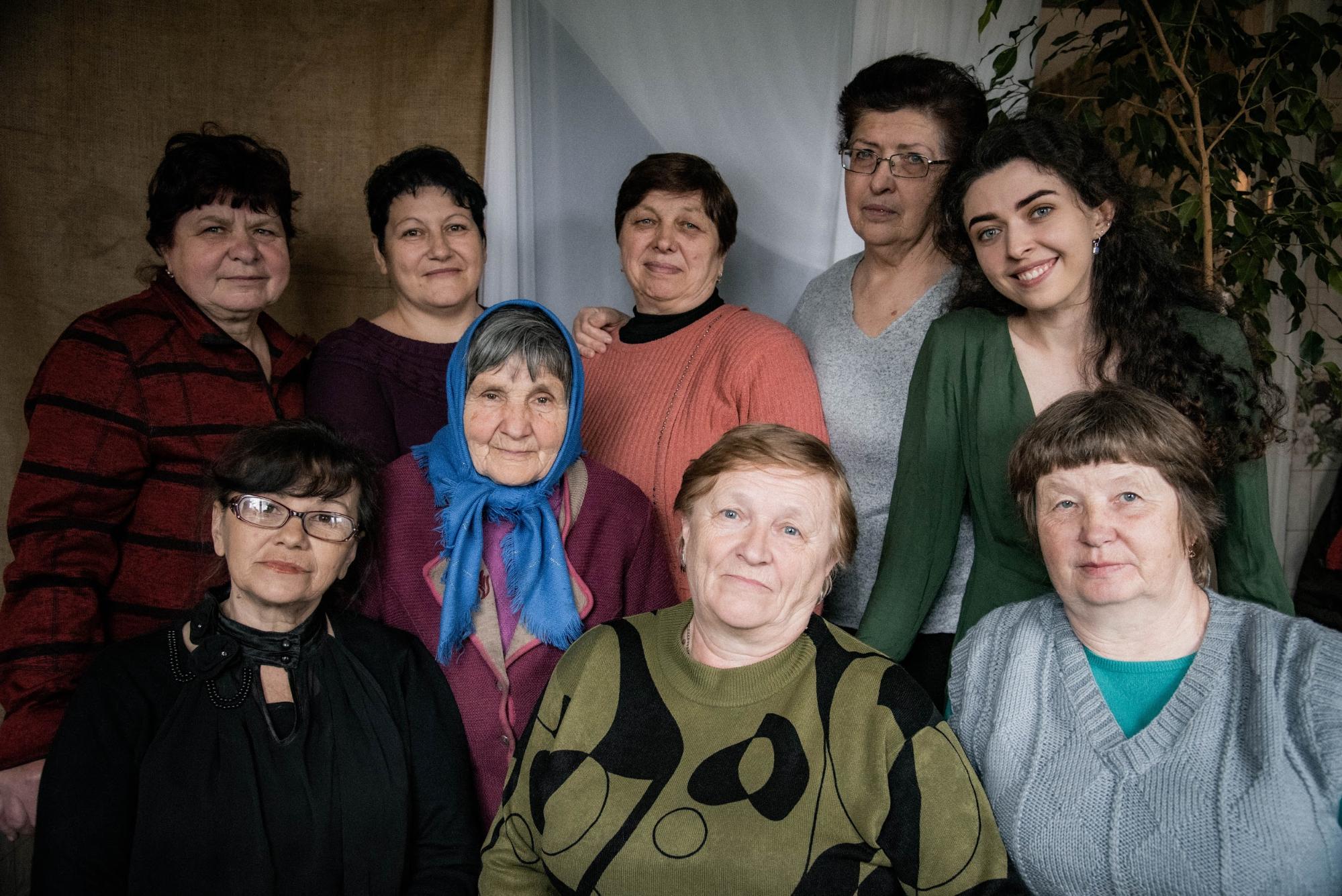
Kira Okhrimenko with the craftswomen of the "Moim. Ridnym" project
Even before the war, the project team facilitated gatherings among craftswomen to promote socialization. These meetings were a forum for discussing the production process, collaborating on designs, and conducting tests. Despite the challenges of war, the "Moim. Ridnym" initiative strives to maintain this practice.
"For example, we recently hosted an event featuring a psychologist and an art therapist from Zaporizhzhia. Our goal was to gauge the response from our local artisans and assess their interest in this type of format. The turnout and feedback far exceeded our expectations, confirming our hypothesis. As a result, we aim to offer more frequent and accessible support and gatherings in the future."
About artisans and products
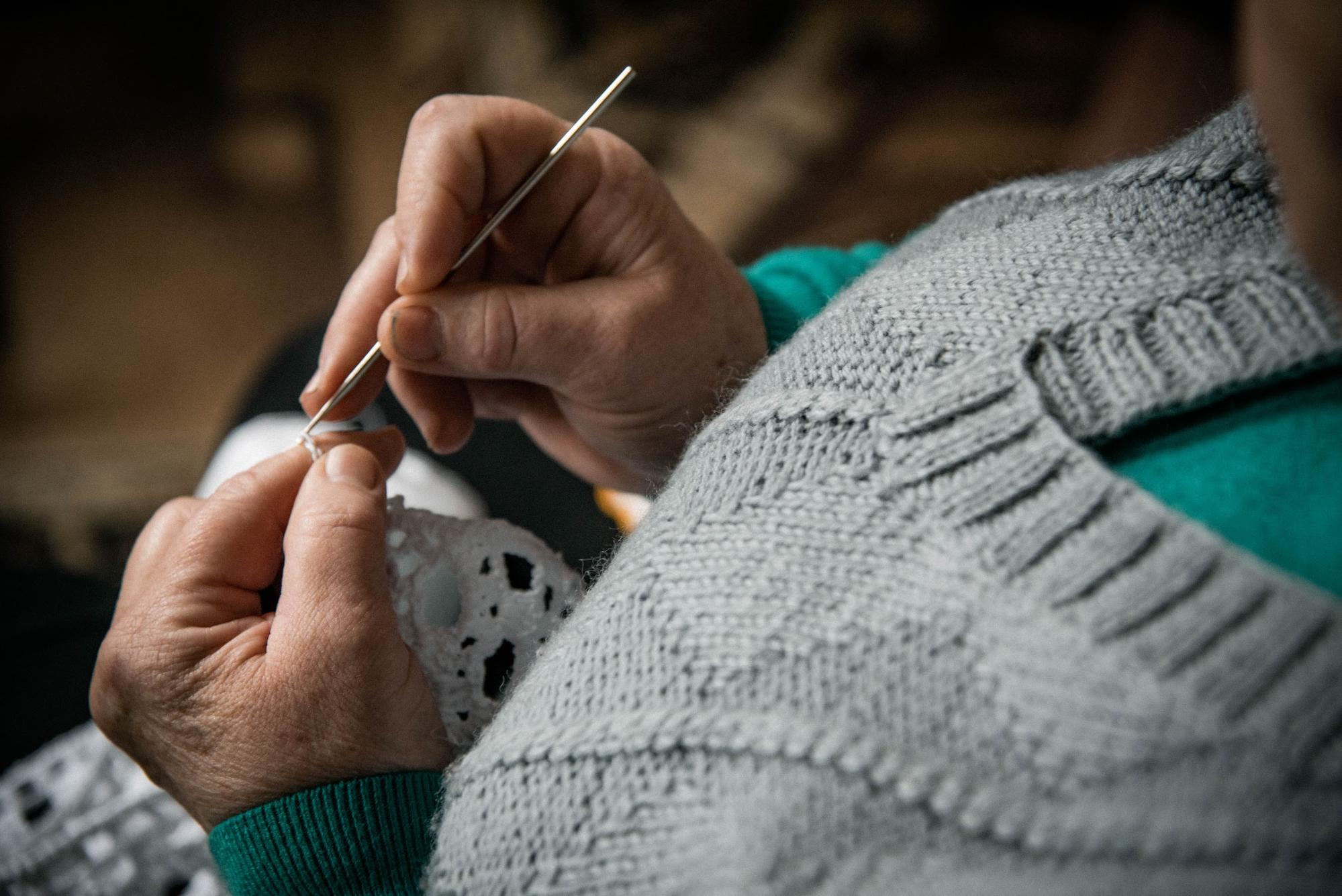
Frequently, artisans come up with exciting ideas and suggest them for the project.
Before the full-scale war erupted, five women were originally part of the project. However, over the course of nearly two years, the number of skilled craftswomen has grown to 23 as the demand for knitted items increased. Most of these women are from villages in the Sumy region, with some participants also coming from areas such as Kharkiv, Kyiv, and Zaporizhzhia. In certain villages with a population of approximately 40, 4-6 women actively contribute to the project, including those who possess the skill of knitting.

The process of making candles
Each artisan focuses on their specialty: embroidery, sewing, gathering herbs (such as mint for tea), creating candles, and knitting. Most of the work is done by knitters, as they produce socks, scarves, gloves, hats for sale, and accessories for the military. Before being sold, all items go through thorough testing, with several prototypes being created. For instance, the hats and scarves are designed to be both durable and soft to the touch, while the socks have optimal heel-toe closure and height.

"We didn't halt production to prioritize comfort and expand our production. You can also purchase items for yourself or your loved ones from us. However, beyond that, we also use our spare time to show our support for those who defend us now – by knitting hats and balaclavas for them," Kira Okhrimenko explains.
Thanks to the incredible support from their community, the project craftswomen created 130 products for Ukrainian defenders last year. This winter, they aim to triple their production and provide 400 soldiers with much-needed warm items, allowing them to focus on their duties without worrying about finding suitable clothing.
Did they really succeed?
Today, for those knitters with family members at the front, participating in the project provides a chance to pass the time and take a break, connect with others facing similar challenges, contribute to the larger fight, and feel a sense of significance.
The gleaming thankful eyes of craftswomen, along with their excitement over fresh yarn, new orders, and new projects, sum up the sentiment of "Moim. Ridnym." Their words are resounding: "I want to wake up earlier and begin knitting immediately because people eagerly anticipate our work."

"Coworking" is not only joint work but also pleasant communication.
From a practical standpoint, it can be seen as a chance for some to obtain funds for a long-awaited surgery, to purchase prescribed medication that was previously unaffordable, or to buy necessary items such as high-quality winter shoes or firewood for heating one's home. Others may choose to use their money to support local volunteers collecting donations for the front and purchasing supplies like butter and sugar to make pastries, which are then delivered to Ukraine's armed forces by these same volunteers.
Kira Okhrimenko says, "It's all about support, communication, and capability. We truly appreciate companies greeting their employees during the holiday season, not with generic Chinese merchandise but with our meaningful products. These orders hold great value for us because they show that the person in charge of the corporate greeting wants to make their colleagues happy and contribute to society. Each customer and benefactor who joins our movement is significant to us. The sense of care we receive also motivates us to keep pushing forward with our endeavors."
Even more helpful solutions!
Another "Makers of Change" forum was held in Kyiv on October 20. The forum, created by the media platform Rubryka and the Bendukidze Free Market Center in partnership with the Friedrich Naumann Foundation for Freedom, aimed to identify and support individuals tackling social issues within their communities or society. The winners of the 2023 selection were announced at the forum.
The project "Moim. Ridnym" was chosen to receive the prize of audience sympathy and a small financial aid. The female artisans are currently raising funds to support the military's everyday needs.
You can also help support a social enterprise. There are various ways to do so:
- You can purchase items from the initiative for yourself or your loved ones. You can also support our particular project, "Khaki-colored Yarn," by donating or sharing information about our production of balaclavas and caps for military personnel. These items are handmade by older women from villages in the Sumy region, who are mothers waiting for their relatives to return from the front. You can find more information and contribute here.
- During the winter season, the number of orders is a noticeable increase. As a result, the project's organizers need more skilled hands. If you are interested, please get in touch with the project through the Instagram page or email them at moim.ridnym@gmail.com.
- You can write about your grandmother or aged mother. The project's managers will talk to you, send you yarn and a pattern, and teach you how to knit different items.


